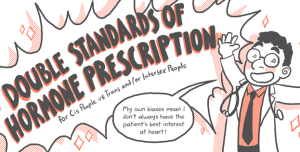We all want our kids to learn about consent. We want them to know that “no” means “no” and only an enthusiastic “yes” means “yes” as they grow older and get into sexual relationships. But I think the things we might be missing is that we’ve been undermining the idea of consent since they were very young. And so, even when we get to the point of explicitly teaching them about it, it’s really not that strong of a teaching because all of our other interactions with them have possibly undermined the idea of consent.
So, I would like to talk about four ways that parents sometimes teach kids that consent doesn’t matter.
The first is tickling and other types of roughhouse play. Now, I think that tickling and being silly and pretending to eat my kids’ feet is one of the greatest parenting skills out there. So, I definitely don’t really think that tickling is bad or roughhousing is bad.
I think the important thing is that the minute your kid says “no,” you stop. Even if you know they are kidding, teach them that “no” means the other person will stop. They’ll learn both that their “no” matters, and they’ll learn that if someone says no to them, that they should immediately listen.
Now, with my kids I know if they say no and I stop, they’ll come and put their foot back in my mouth, because they don’t really mean “no,” they want me to keep chewing, it was just a game. Or they’ll pull the shirt up again and ask me to tickle. And that’s fine, so we keep going on. But I do immediately listen to the word “no”.
The other thing about tickling is that sometimes kids don’t say “no”. They think that, you know, you’re having a lot of fun at it and that they’re supposed to like it. So if you are tickling a child and then you stopped so that they can catch their breath, first of all, let them catch their breath, and if they really still want you to tickle, they will indicate that. They’ll lift their shirt back up so you can get their belly, or they’ll nudge you, or my daughter will say “Mommy, do it again!”
So, I think it is important to make sure that rough-and-tumble play or tickling, those types of physical games, that is really important that we make it very consensual and teach them that “no” means “no.”
The second way that we sometimes teach kids that consent doesn’t matter is by contradicting their feelings. I think this is a huge problem because it just comes so naturally. I’ve talked about this before where a kid says “I’m cold” and we say “No you’re not, it’s hot in here” or “I’m hungry”, “No you’re not, you just ate.” “I’m tired”, “No you aren’t, you just got up from your nap.” I think that we, in our minds as parents, we know “What? Why are they saying this? She can’t be hungry, she just ate.”
But by saying so, we teach them not to trust their own instincts and their own feelings, and then these are feelings that we want them to trust when they’re in their twenties and they’re in a situation that they are not feeling comfortable with, we want them to trust their gut reaction.
So, instead of contradicting kids, we can just ask them an open-ended in a neutral way. So, when your child says “It’s cold in here”, you can say “Is it? I’m kind of hot in here.”
Here’s another big one. “I hate grandma.” That’s the type of thing that really triggers us to be like, “No you don’t. Don’t say that. That’s my mother. You love grandma and grandma loves you.” You can immediately start spilling out all of these denials of their feelings because we don’t want them to hate grandma and we probably know that they don’t hate grandma.
But the thing is, that contradiction of their feelings isn’t helping the long-term goal of having them trust their feelings. So, once again, an opened an open-ended question like “You do? I think grandma really loves you,” or, “Last week you had a lot of fun with grandma. Are you sure?”
The third way that we sometimes teach kids that consent isn’t important, is through forced hugs and kisses, and this is all in the guise of teaching politeness. We want them to give Uncle Joe a hug and a kiss when you see him because he is their elder and it is important to respect him in that way and because he wants a hug and a kiss, regardless of how your child is feeling. And the idea being that if they don’t go give Uncle Joe a hug and a kiss, it reflects poorly on you, that your kids are rude or standoffish or whatever. And we worry about that as parents, and so then we end up, you know, whether it’s by force or coercion, getting our kids to hug and kiss someone that they don’t want to.
This is a huge red flag. You know, we don’t want our teen daughters or teen sons to be in a sexual situation where they are feeling like they don’t really want to continue. But they feel like they can’t say anything because they have come as far and it would be rude to stop, or that type of thing. This is exactly the problems that we get in young adults with not asking for consent but also not being able to give it because you don’t feel that you have that place to say “No, I’m not comfortable with this. We need to stop right now.”
So, it’s very important not to make your kids hug and kiss or shake hands or anything like that, you know. You know Uncle Joe, you saw him last year and if Uncle Joe asks for a hug and kiss, you can say “Do you wanna give him a hug and kiss or just wave hi?” And then have a wave hi or blow a kiss, whatever is comfortable in your family for some type of non-touching related greeting.
And also you don’t have to force your kid to greet someone that they don’t want. We often are forcing our kids to hug relatives that to them, they don’t really remember–very distant relatives. And then we wonder why sexual abuse is frequently a family member and why the kids didn’t tell Mom and Dad. Well, they have been taught their whole lives that they should respect their elders, that they should be giving physical affection to family members. So, it becomes very hard for them to then say “I was touched in an inappropriate way.”
So, this one has a really big implication right now for child sexual abuse. You really want your kids to know that they can say no and they never have to be touched in the way that they don’t want to be touched. And also for when they are older, so they feel like whenever they get that feeling in their stomach that “I don’t wanna do this next thing, I don’t wanna be touched in this way,” that they know that they can say no.
Alright, and the fourth way that we sometimes teach kids that consent doesn’t matter, kind of plays off the last one, and that is just generally respecting your elders. Right now on Pinterest, a very popular article is getting pinned a lot about the interrupt rule.
And this is a rule that kids, if they instead of coming and interrupting you when you’re on the phone or you’re talking to another adult in person that you teach them to put their hand on your shoulder, so that you know they need them and you can put your hand back, acknowledging that. “I acknowledge that you need me; I’ll be just a second.” It’s to teach your kids not to interrupt.
I don’t particularly have anything wrong with that rule. Interrupting can be rude and it’s very polite to interrupt in a non-verbal way if you can. And it’s also important to teach kids the difference between an emergency that they would need to just burst in and start screaming about and “I want a juice box,” which maybe want them to wait a second because you’re on an important phone call.
So, I don’t have a problem with the idea of teaching your kids the etiquette of interruption. However, the article talks about never interrupting adults, because you need to respect your elders. And that terminology really rubbed me the wrong way. The idea that because someone is older than you that what you think matters less, is nothing but a power play.
It’s teaching them that the person who is older, bigger, stronger is more important than what they want. And then we wonder why we sometimes have adults that are in abusive relationships. When really we’ve modeled for them that size equals power, age equals power, you know whatever characteristic there might be, equals power, and that means that your ideas are less than that person who has the power.
The other thing being for me is that respect is something that’s earned. It’s not just automatically given and I don’t mean that you should be completely rude to someone until they have proven that they are worthy of your respect. I’m also teaching kindness towards everyone. But this idea that someone, just because of their age, automatically should be deferred to without trusting your own thoughts and feelings about that person is just false.
So, once again, I’m not against the interrupt rule and teaching etiquette about interrupting. But I am against using the reason that “Respect your elders”, it’s kind of like using “Because I’m your mom and I said so.” It’s not teaching them anything, if anything that it’s teaching them that power is the most important thing in the world. And if you have power, you can force it on other people. And that’s really not what we wanna teach, so, I think respect your elders is just kind of a lazy shorthand that doesn’t do what we are hoping that it will do.
So, those are four ways that we sometimes teach our kids that consent is not important, that you might not be thinking of. So, addition to explicitly talking about consent as it applies to sexual relationships as your kids enter the teen years, think too how you’re treating even your one and two years olds, and how you might be undermining the concept of consent even at that age. And I think you’ll have a kid that is much better prepared to hold their own and trust their instincts and say no when they mean no when they’re teenagers.
Alright, I’m Paige, this has been Gentle Parenting Answers. If you have your own question that you’d like to submit, my email would be at the end of the video as well as our website. We have two new parenting classes starting on September. If you are interested, so, give it a look. Talk to you later, bye!




















